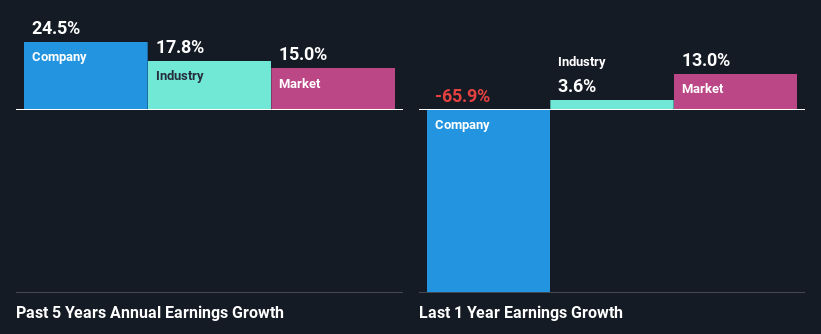- Mexico
- /
- Basic Materials
- /
- BMV:CEMEX CPO
Is CEMEX, S.A.B. de C.V.'s (BMV:CEMEXCPO) Recent Stock Performance Influenced By Its Financials In Any Way?

CEMEX. de's (BMV:CEMEXCPO) stock is up by 3.4% over the past three months. We wonder if and what role the company's financials play in that price change as a company's long-term fundamentals usually dictate market outcomes. In this article, we decided to focus on CEMEX. de's ROE.
Return on equity or ROE is an important factor to be considered by a shareholder because it tells them how effectively their capital is being reinvested. In short, ROE shows the profit each dollar generates with respect to its shareholder investments.
View our latest analysis for CEMEX. de
How To Calculate Return On Equity?
ROE can be calculated by using the formula:
Return on Equity = Net Profit (from continuing operations) ÷ Shareholders' Equity
So, based on the above formula, the ROE for CEMEX. de is:
1.6% = US$199m ÷ US$12b (Based on the trailing twelve months to December 2023).
The 'return' is the profit over the last twelve months. Another way to think of that is that for every MX$1 worth of equity, the company was able to earn MX$0.02 in profit.
What Is The Relationship Between ROE And Earnings Growth?
We have already established that ROE serves as an efficient profit-generating gauge for a company's future earnings. Based on how much of its profits the company chooses to reinvest or "retain", we are then able to evaluate a company's future ability to generate profits. Assuming all else is equal, companies that have both a higher return on equity and higher profit retention are usually the ones that have a higher growth rate when compared to companies that don't have the same features.
CEMEX. de's Earnings Growth And 1.6% ROE
As you can see, CEMEX. de's ROE looks pretty weak. Even compared to the average industry ROE of 7.1%, the company's ROE is quite dismal. Despite this, surprisingly, CEMEX. de saw an exceptional 25% net income growth over the past five years. We reckon that there could be other factors at play here. For instance, the company has a low payout ratio or is being managed efficiently.
Next, on comparing with the industry net income growth, we found that CEMEX. de's growth is quite high when compared to the industry average growth of 18% in the same period, which is great to see.

Earnings growth is an important metric to consider when valuing a stock. What investors need to determine next is if the expected earnings growth, or the lack of it, is already built into the share price. This then helps them determine if the stock is placed for a bright or bleak future. Is CEMEX CPO fairly valued? This infographic on the company's intrinsic value has everything you need to know.
Is CEMEX. de Using Its Retained Earnings Effectively?
Given that CEMEX. de doesn't pay any dividend to its shareholders, we infer that the company has been reinvesting all of its profits to grow its business.
Conclusion
In total, it does look like CEMEX. de has some positive aspects to its business. With a high rate of reinvestment, albeit at a low ROE, the company has managed to see a considerable growth in its earnings. Having said that, looking at the current analyst estimates, we found that the company's earnings are expected to gain momentum. To know more about the company's future earnings growth forecasts take a look at this free report on analyst forecasts for the company to find out more.
New: AI Stock Screener & Alerts
Our new AI Stock Screener scans the market every day to uncover opportunities.
• Dividend Powerhouses (3%+ Yield)
• Undervalued Small Caps with Insider Buying
• High growth Tech and AI Companies
Or build your own from over 50 metrics.
Have feedback on this article? Concerned about the content? Get in touch with us directly. Alternatively, email editorial-team (at) simplywallst.com.
This article by Simply Wall St is general in nature. We provide commentary based on historical data and analyst forecasts only using an unbiased methodology and our articles are not intended to be financial advice. It does not constitute a recommendation to buy or sell any stock, and does not take account of your objectives, or your financial situation. We aim to bring you long-term focused analysis driven by fundamental data. Note that our analysis may not factor in the latest price-sensitive company announcements or qualitative material. Simply Wall St has no position in any stocks mentioned.
About BMV:CEMEX CPO
CEMEX. de
Produces, markets, distributes, and sells cement, ready-mix concrete, aggregates, urbanization solutions, and other construction materials and services worldwide.
Moderate growth potential with mediocre balance sheet.


